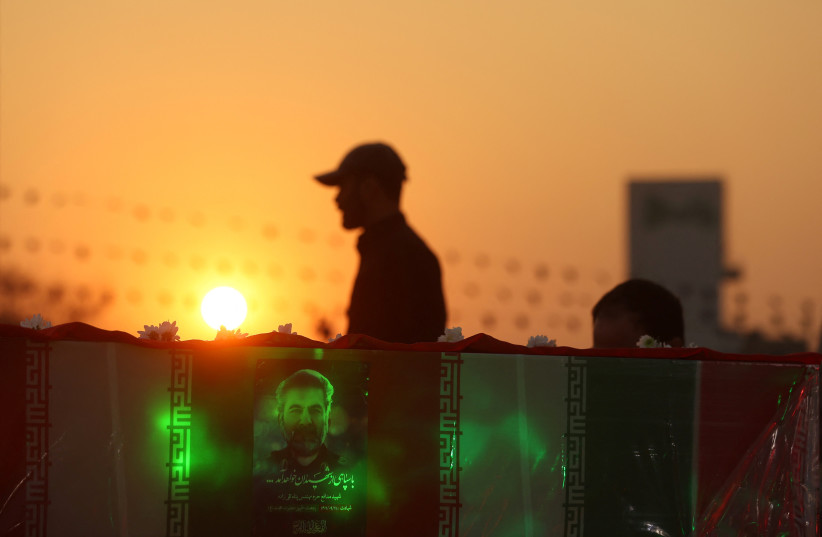The hidden hand that plays the region: The threat and influence of Iran’s Quds Force
In the intricate and turbulent world of international politics, few criminal entities are as controversial as Iran’s Quds Force. In the shadowy corridors of global geopolitics, it emerges not merely as a player but as a pivotal orchestrator of instability.
This secretive and elite subdivision of the Islamic Revolutionary Guard Corps (IRGC) is tasked with extraterritorial military and clandestine terrorist operations, standing at the core of Iran’s ambitions to redefine the geopolitical landscape of the Middle East and extend its influence beyond. The Quds Force operates amid a complex web of malign activities, sophisticated alliances, and conflicts, employing a mix of diplomacy, military strategy, and covert terrorist operations that significantly impact regional stability.
As the world grapples with the challenges of maintaining equilibrium, understanding the Quds Force’s detrimental influence on global peace is paramount. Examining its multifaceted operations, assessing its profound influence on regional dynamics, and analyzing the global response to its maneuvers are crucial for anyone trying to decipher the ongoing geopolitical shifts in this volatile part of the world. This exploration is not only essential for grasping the current state of affairs but also for predicting future movements in a region that stands at the precipice of significant geopolitical changes.
Amid the global landscape of sanctions and rigorous international restrictions, particularly those imposed by the United States, Iran’s Quds Force demonstrates an extraordinary capacity to sustain and even augment its financial network. This resilience is largely facilitated through intricate alliances with countries such as Russia and China, that help bypass conventional financial systems, heavily monitored and regulated by Western powers. These collaborations involve complex schemes – including oil smuggling operations from Syria with Russian collusion – and financial mechanisms orchestrated through Chinese entities. These actions not only highlight the Quds Force’s ability to adapt to economic pressures but also underscore the significant limitations of current sanctions as an effective means of curtailing its global influence.
THE DEEP involvement of the Quds Force in the global narcotics trade is not merely an operational sidebar but a central strategy in its financial architecture. From the poppy fields of Afghanistan to the coca-producing regions of Latin America, it has embedded itself deeply within the drug trafficking underworld. The benefits are twofold: They generate considerable revenue to fund operations and extend Iran’s geopolitical influence into critical regions. This nefarious involvement in narcotics also leverages chaos and instability in strategic areas, furthering Iran’s broader regional ambitions.

At the core of the Quds Force’s operational strategy is its extensive network of terrorist proxy groups, which includes the notorious Hezbollah in Lebanon and the Houthis in Yemen. These state-backed proxies are instrumental in extending Iran’s influence beyond its borders, undertaking much of the physical confrontations involved in Iran’s regional power plays. This strategy of proxy warfare complicates direct retaliation from adversaries such as the United States and Israel, allowing Iran to assert its influence and conduct operations while maintaining plausible deniability. The efficacy of this approach lies in its ability to indirectly engage in conflicts, thereby minimizing direct Iranian casualties and diplomatic repercussions.
Analyzing Iran’s motives and strategies in the Middle East
IRAN’S STRATEGY of utilizing terrorist proxy groups exemplifies a classic approach to asymmetric warfare, where direct conflict is avoided in favor of indirect engagements through third-party actors. This method allows Iran to pursue its geopolitical objectives while significantly reducing the risks associated with direct military engagement. The effectiveness of this strategy is particularly evident in the region’s ongoing conflicts, where proxy groups carry out operations that align with Tehran’s objectives, thereby extending its influence while shielding it from direct international military retaliation.
The IRGC, with the Quds Force as its pivotal arm, has evolved into a formidable political and economic force within Iran.
During Mahmoud Ahmadinejad’s presidency, the IRGC’s influence significantly permeated various sectors of Iranian governance and the economy, blurring the distinctions between state and military interests. This integration illustrates the profound roles that the IRGC and the Quds Force play in military operations and within the civic and economic realms of the country.
The assassination of Qasem Soleimani marked a significant, albeit temporary, disruption in the Quds Force’s operations. However, the rapid appointment of Esmail Qaani as his successor signifies a clear message of continuity and resilience.
Facing increasing international scrutiny and tightening sanctions, the Quds Force is likely to recalibrate its strategies towards more covert and strategically nuanced operations. The international community continues to watch closely, grappling with the challenge of how to effectively counteract an organization that thrives in the shadows of global politics and the complex interplay of regional conflicts.
As events continue to unfold in the Middle East, the role of the Quds Force as both a precursor and a creator of geopolitical shifts is increasingly apparent. Understanding these dynamics is essential for regional actors and international stakeholders aiming to influence outcomes in the Middle East.
The writer is a counterterrorism analyst and Middle East studies researcher based in Washington, with a particular focus on Iran and ethnic conflicts in the region. His newly-published book is The Black Shabbat, published in the US. Follow him on X @EQFARD and at erfanfard.com.





Comments are closed.